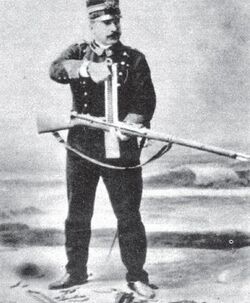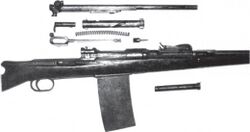Engineering:Cei-Rigotti
| Cei-Rigotti | |
|---|---|
 | |
| Type | Selective-fire rifle |
| Place of origin | Kingdom of Italy |
| Production history | |
| Designer | Amerigo Cei-Rigotti |
| Designed | c. 1900 |
| Specifications | |
| Mass | 4.3 kg (9.5 lb) |
| Length | 1,000 mm (39 in) |
| Barrel length | 482.6 mm (19.00 in) |
| Cartridge | 6.5×52mm Mannlicher–Carcano 7.65x53mm Mauser |
| Action | Gas piston, self-loading |
| Rate of fire | Up to 900 rpm |
| Muzzle velocity | 730 m/s (2,400 ft/s) |
| Maximum firing range | 1,400 m (1,500 yd) |
| Feed system | 10-, 20- and 50-round fixed box magazine |
| Sights | Iron sights |
The Cei-Rigotti (also known as the Cei gas rifle[1]) is an early automatic rifle created in the final years of the 19th century by Amerigo Cei-Rigotti, an officer in the Royal Italian Army.
Description
The rifle was gas operated and had selective fire capabilities (single shots or fully automatic). Available information on this gun is sparse and contradictory.
According to several publications, the prototype rifle was chambered for the 6.5×52mm Mannlicher–Carcano.[2] The gun was supposedly presented by Cei-Rigotti to his superiors in a private demonstration in 1895. An Italian newspaper reported on this event in 1900.[3] According to another source, a demonstration was actually held publicly in Rome on June 13, 1900, when 300 rounds were fired on full automatic before the gun got so hot it seized up.[4] Yet another source mentions a demonstration in the same year the Brescia Arsenal.[5]
The British also ordered and tested the gun after this event, but they found it unsuitable.[3] The exemplar found at the UK National Firearms Centre in Leeds is chambered in 7.65x53mm Mauser, as is another exemplar found in a U.S. private collection.[6]
The rifle fed from a fixed box magazine, loaded through stripper clips.[6] Reportedly, prototypes with magazines up to a capacity of 50 rounds existed.[2]
See also
- Browning Automatic Rifle
- Charlton Automatic Rifle
- Farquhar-Hill rifle
- Fedorov Avtomat
- Furrer M25
- Huot Automatic Rifle
- Mors submachine gun
References
- ↑ Daniel D. Musgrave; Thomas B. Nelson (1967). The World's Assault Rifles and Automatic Carbines. T. B. N. Enterprises. p. 225.
- ↑ 2.0 2.1 David Westwood (2005). Rifles: An Illustrated History Of Their Impact. ABC-CLIO. p. 364. ISBN 978-1-85109-401-1. https://books.google.com/books?id=hLBTkNZ8U44C&pg=PA364.
- ↑ 3.0 3.1 David Miller (2003). The illustrated directory of twentieth century guns. Zenith Imprint. pp. 224–225. ISBN 978-0-7603-1560-6. https://books.google.com/books?id=d9AftMZgOOkC&pg=PA224.
- ↑ W. H. B, Smith and Joseph E. Smith, The Book of Rifles, 1948, National Rifle Association, p. 68
- ↑ Ian V. Hogg (1978). The complete illustrated encyclopedia of the world's firearms. A & W Publishers. p. 108. ISBN 978-0-89479-031-7.
- ↑ 6.0 6.1 McCollum, Ian (October 24, 2012). "Cei-Rigotti". ForgottenWeapons.com. http://www.forgottenweapons.com/early-semiauto-rifles/cei-rigotti/. Retrieved July 12, 2013.
External links



